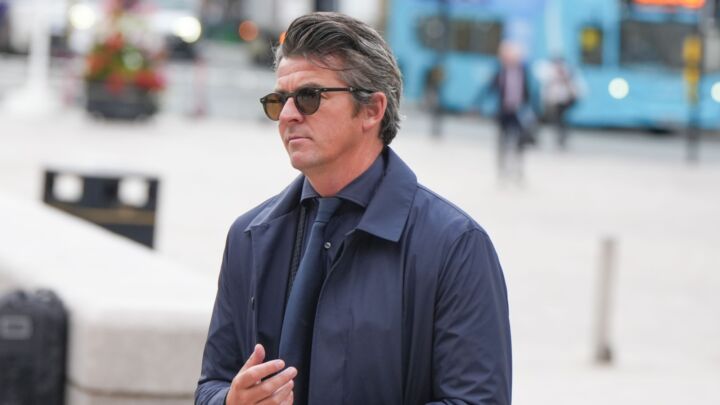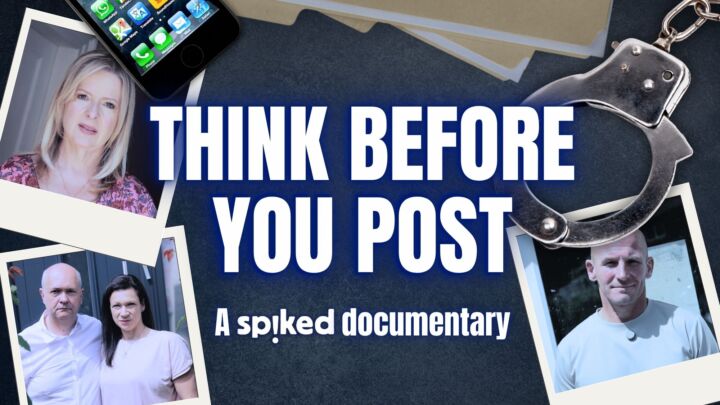The racial delusions of Sol Campbell
Campbell wasn't overlooked for the England captaincy because he was black, but his claim reflects an unhealthy modern outlook.

Want unlimited, ad-free access? Become a spiked supporter.
Sol Campbell is a bitter man isn’t he? He has more chips on his shoulder than a branch of Harry Ramsden’s. The former England defender has branded the Football Association ‘institutionally racist’ and claims he would have been captain of the national team for 10 years if he was white. Listen, I’d be the first to stick the boot into the FA. ‘Institutionally incompetent’ is how I’d describe them. But racist? Sorry, Sol but you’re wide of the mark there. Playing the race card is a pretty cheap attempt to blame the FA for your own lack of leadership attributes.
Sol Campbell, you won’t be surprised to learn, has an autobiography to flog. And his ‘Is it cos I is black?’ bitterness towards the FA clearly sells more copies of The Sunday Times, which is serialising his memoir, than tales of his dalliances with tennis star Martina Hingis or über-bland songstress Dido. ‘I think the FA wished I was white. I had the credibility, performance-wise, to be captain’, Campbell claims. ‘Michael Owen was made a captain ahead of me. I thought: “What is going on here?” I think the FA didn’t want me to have a voice… I’ve asked myself many times why I wasn’t [captain]. I keep coming up with the same answer. It was the colour of my skin.’
In many ways Sol Campbell is the quintessential modern footballer. Not in the sense of the versatile ball-playing central defender who can also operate in midfield. Rather, he’s an introverted, sensitive soul who has battled with depression and has acquired the thin-skinned victim sensibility of a Guardian reader. In short he’s a guy with a Louis Vuitton manbag full of ‘issues’. Campbell seemed genuinely perplexed and hurt that Spurs fans branded him a ‘Judas cunt with HIV’ for leaving White Hart Lane for hated local rivals Arsenal. ‘If this happened on the streets, you’d be arrested’, he told the BBC’s Today programme. ‘This is a human-rights situation.’
Campbell has even suggested that there was an element of racism in the vitriolic abuse he received from Spurs fans. ‘It was camouflaged — but there was racism in there’, he told the London Evening Standard last year. Certainly there were unpleasant gay slurs aimed at the former Spurs defender, but, as with his latest complaints about the FA, I think he’s completely wrong to cry ‘racism’. Spurs fans are particularly unforgiving towards any players who defect to the Gooners, but they have no reputation whatsoever for racist behaviour.
Campbell’s claim that he was overlooked for the England captaincy because he was black doesn’t really stand up to any great scrutiny. Firstly, there really is no good reason to believe that skin-colour was a factor in deciding who should wear the captain’s armband during the 1990s. That might have been a legitimate concern in the 1970s and 1980s, when black footballers were regarded as exotic and skillful but bereft of leadership qualities. But the old racial stereotypes had long been debunked by the time Campbell was winning international caps. If, as Campbell says, there was a ‘glass ceiling’ for black players, then why was Paul Ince given the captain’s armband in 1993? Martin Samuel, writing in the Daily Mail, argues that Campbell wasn’t the victim of racism but bad luck – he was recuperating from a shoulder injury when David Beckham was appointed captain.
It’s significant that Campbell’s complaints have been greeted with a fair degree of scepticism within the game. Former England managers Graham Taylor and Sven Goran Eriksson have strenuously denied that the FA ever tried to influence their choice of captain. Even Kick It Out chairman Lord Ouseley has questioned the timing of Campbell’s accusations. ‘Trying to link the two things, as Sol Campbell has with his comments, draws cynicism because he is trying to sell a book’, Ouseley told the Standard.
Maybe, just maybe, Campbell was overlooked because he wasn’t the best man for the job. I think it’s significant that there was never any clamour for Campbell to be given the England captaincy during his career. Why? Because he simply wasn’t regarded as a leader by managers, teammates or pundits. No doubt Campbell, who is clearly looking at the issue through race-tinted spectacles, won’t entertain the possibility that he was in any way flawed.
Yet there is good reason to question whether he was leadership material. His former Arsenal team-mate, Ian Wright, told BBC Five Live that Campbell’s introversion meant that there were better candidates. ‘Captains I played under were real vocal players, I’d be more used to those. If they were both up there I’d go for John Terry’, said Wright. ‘Sol is quiet, goes and does his stuff, great defender. JT gets amongst it. It should come down to whether you’re the best captain for it.’ It’s a point echoed by Martin Samuel. ‘Campbell was seen as a quiet, introspective sort; not obvious captaincy material, despite his role at Tottenham. When he went to Arsenal there was never any question of usurping Adams, and the armband then passed to Patrick Vieira without complaint.’
I’ve frequently written about how today’s campaigns against racism in football illustrate the degeneration of a once-progressive political cause into an intolerant demand for etiquette policing. Sol Campbell’s case illustrates another equally regressive facet of the contemporary racial politics: the fatalistic culture of victimhood. In this pessimistic worldview, the concept of ‘institutional racism’ absolves black people of any responsibility for their predicament. Overlooked for promotion? ‘Nothing to do with me, guvnor; it’s institutional racism.’ It might be comforting for Sol Campbell to believe that racism robbed him of the England captaincy rather than his lack of leadership credentials. Comforting, but wrong. The only glass ceilings are in Sol Campbell’s imagination.
Duleep Allirajah is spiked’s sports columnist. Follow him on Twitter @DuleepOffside.
You’ve read 3 free articles this month.
Support spiked and get unlimited access.
Help us hit our 1% target
spiked is funded by readers like you. It’s your generosity that keeps us fearless and independent.
Only 0.1% of our regular readers currently support spiked. If just 1% gave, we could grow our team – and step up the fight for free speech and democracy right when it matters most.
Join today from £5/month (£50/year) and get unlimited, ad-free access, bonus content, exclusive events and more – all while helping to keep spiked saying the unsayable.
Monthly support makes the biggest difference. Thank you.









Comments
Want to join the conversation?
Only spiked supporters and patrons, who donate regularly to us, can comment on our articles.